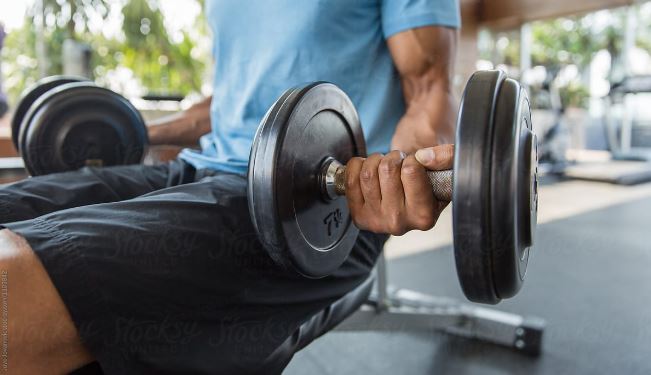
One in five people, aged 25-54, claim they 'don't have time to exercise and eat healthy food.' Yet, the American Heart Association says just 75 minutes of vigorous exercise is all you need to squeeze in each week to improve your health. With the closure of gyms as a social distancing measure and thus disrupting workout routines, the moderately active have opted out of working out at all. Exercise is especially important because it can reduce stress, prevent weight gain, boost the immune system, and improve sleep. Public health officials say that exercise, while undoubtedly crucial under normal circumstances, is essential to your physical and mental well-being during the COVID-19 pandemic.
The coronavirus has prompted 'stay at home' guidelines, and people are now spending more time sitting around than walking. The World Health Organization recommends taking a short break from sitting by doing 3-4 minutes of light intensity physical movement, such as walking or stretching, to help ease your muscles and improve blood circulation and muscle activity. The recommended 75 minutes of vigorous-intensity physical activity per week can still be achieved at home, with no special equipment and limited space.
Short active breaks during the day.
You would be surprised at the number of things that can help you stay active around the house, such as walking up and down the stairs, playing with your kids or pets, dancing, gardening, or taking part in a virtual fitness class. Every 30 minutes or whenever you're on the phone, stand and walk around your house to stretch your muscles. You could also throw in a mini-workout like chair pushups, legups or arm raises, and many more exercises that google search away. It may not look like much, but research has shown that "avoiding inactivity" can make a difference.
ALSO READ: How to lose your love handles in 14 days
Take your workout online
The internet and related technologies have proven to be essential tools in this period, and over 36.9 million Kenyans have internet subscriptions. Don't just use your internet for zoom calls and browsing social media sites. There are endless free exercise videos on YouTube to try, regardless of your fitness level or the size of your living room. Instagram is another excellent resource with Telkom Kenya and ABSA Kenya contracting fitness instructors giving free workouts on their platforms. If you have no access to the internet at all, there are fitness shows on TV stations like KTN in the morning that will help you break a sweat.
Being active outdoors
As long as you don't have any coronavirus symptoms, you can go out and be as active throughout the day. Just ensure you have your mask on and avoid crowded places. You can have a quick walking or jogging session around your neighbourhood. Many Kenyans have been spotted brisk walking or biking in the pedestrian paths during mornings and evenings to stay active so don't be shy. Additionally, it beats the monotony of eating and online meetings all day long.
"I was very active at the gym but when they closed I gained about 3 kilograms just sitting in the couch and eating to kill boredom. My neighbours started running together in groups of five and I joined. It's been two months and I'm glad I started," says Millicent, a resident in South C.
ALSO READ: What exercises you should do at every decade of your life to stay fit
Make it interesting
All this sounds good on paper but may be easier said than done. Our bodies are wired to oppose new things because they perceive them as a threat. But there is a way around it. Trick your brain by making these changes a sort of game. For example, skip the selfies and daily check-ins and opt for using social media to stay on track with your fitness goals. One study found that the support, accountability, and even healthy competition in online groups can help you adhere to an exercise routine. Try joining a 30-day challenge that motivates you when you say the checkboxes on every accomplished day.
Finally, before taking a shower or watching a movie on Netflix, or even eating your favorite snack, pay for it with a certain amount of reps. Try ten pushups before every snack, and you will notice your activity levels rise. Note that if you're new to exercise, start small. Try maybe 10 minutes of yoga or walking a day, then gradually build up.
All these exercises are great if you do not have the virus, but what about those who are infected? The coronavirus attacks the lungs and respiratory system, sometimes resulting in significant damage. You need to consult your physician before going back to exercising.
Johns Hopkins physical therapist Peiting Lien says, "Working toward recovery starts simple: with a focus on breathing." She recommends deep breathing exercises for recovering patients to reduce the stress, common to patients with the coronavirus.
 The Standard Group Plc is a multi-media organization with investments in media
platforms spanning newspaper print
operations, television, radio broadcasting, digital and online services. The
Standard Group is recognized as a
leading multi-media house in Kenya with a key influence in matters of national and
international interest.
The Standard Group Plc is a multi-media organization with investments in media
platforms spanning newspaper print
operations, television, radio broadcasting, digital and online services. The
Standard Group is recognized as a
leading multi-media house in Kenya with a key influence in matters of national and
international interest.
